|
|
|
Sort Order |
|
|
|
Items / Page
|
|
|
|
|
|
|
| Srl | Item |
| 1 |
ID:
000714


|
|
|
|
|
| Publication |
London, Hodder and Stoughton, 1999.
|
| Description |
119p.Pbk
|
| Standard Number |
0340746971
|
|
|
|
|
|
|
|
|
|
|
|
Copies: C:1/I:0,R:0,Q:0
Circulation
| Accession# | Call# | Current Location | Status | Policy | Location |
| 042130 | 940.540943/DAR 042130 | Main | On Shelf | General | |
|
|
|
|
| 2 |
ID:
114169
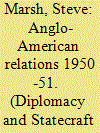

|
|
|
|
|
| Publication |
2012.
|
| Summary/Abstract |
In 1949-1950, Britain rejected ideas of being a third force between the post-war Superpowers and adopted instead an approach that has been the keystone of British foreign policy from that point onwards: "hugging America close." The aspiration was to establish a position closely related to the United States yet sufficiently independent, effectively to harness American power to British ends. This now familiar position has been much-debated recently in the context of post-9/11 military interventions in Iraq and Afghanistan especially. However, this analysis examines three crises immediately following the British decision in 1949-1950 to give priority to the Anglo-American "special relationship" to demonstrate that, for Britain, this policy from the onset was both advantageous and potentially difficult. The outcomes of crises over NATO's Atlantic Command, Iranian oil, and ANZUS demonstrate how expansion of United States influence benefitted Britain but sometimes also required painful British adjustment and loss of prestige.
|
|
|
|
|
|
|
|
|
|
|
|
|
|
|
|
| 3 |
ID:
117427
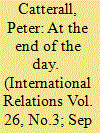

|
|
|
|
|
| Publication |
2012.
|
| Summary/Abstract |
Pre-publicity for the final volume of Harold Macmillan's memoirs, At the End of the Day, stressed that it would provide the British side of the Cuban missile crisis for the first time. The Churchillian model chosen, changes required by the Cabinet Office and Macmillan's desire to rebuke those political opponents who claimed that the crisis demonstrated a lack of British influence in Washington, however ensured a focus on his personal relationship with President Kennedy. His larding the text with contemporary observations from his diaries also skewed Macmillan's account and, in particular, underplayed the significance of British moves at the United Nations in New York to secure a credible United Nations inspection regime and a US guarantee of the inviolability of Cuba. Careful reconstruction of Macmillan's real-time experience of the Cuban missile crisis demonstrates the limitations of his own account of this event.
|
|
|
|
|
|
|
|
|
|
|
|
|
|
|
|
| 4 |
ID:
116388
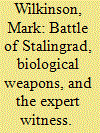

|
|
|
|
|
| Publication |
2012.
|
| Summary/Abstract |
In studying the sources for British foreign policy in the twentieth century we need constantly to remember that we are dealing with a laundered archive.
-Christopher Andrew, 1987 1
The problems associated with the researching of intelligence-related issues have been well documented. The ever-growing and increasingly diverse community of academics immersed in the study of intelligence share a range of common problems related not just to access to material, but also the verification of that material when it is obtained. 2 Indeed, the relative precariousness of much of the work in the field of Intelligence Studies is well recognized. Epistemologically, one of an academic's most significant challenges is attempting to verify potentially valuable material that has come from a limited or fragmentary range of sources. 3 Although the majority of researchers working in the field of Intelligence Studies trained as diplomatic, military, or colonial historians of the twentieth century, in fact, their problems are more inclined to resemble those of historians examining much earlier periods, where documentary evidence is thin. 4 Sometimes they might even resemble the intelligence officers that they are studying, trying to assess a potential "scoop" that has come in from a beguiling, but problematic, single source.
|
|
|
|
|
|
|
|
|
|
|
|
|
|
|
|
| 5 |
ID:
112080
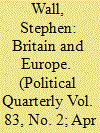

|
|
|
|
|
| Publication |
2012.
|
| Summary/Abstract |
Britain decided to join the European Community because its postwar, postimperial policies had failed and successive Governments saw no viable alternative. After ten years of being denied entry by De Gaulle, Britain joined on disadvantageous terms and with the British political parties, and the British people, deeply divided. Accession did not resolve the underlying issues and Britain's first year of membership saw an unprecedented oil crisis, bad relations between Britain and the United States and the demise of the British government led by Edward Heath. The underlying issues which had not been resolved in the accession negotiations were reopened by Harold Wilson and later by Margaret Thatcher. Some of them remain unresolved in British politics to this day.
|
|
|
|
|
|
|
|
|
|
|
|
|
|
|
|
| 6 |
ID:
028666
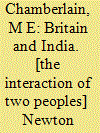

|
|
|
|
|
| Publication |
Newton Abbot, David and Charles, 1974.
|
| Description |
272p. hbk
|
| Series |
Library of Politics and Society
|
| Standard Number |
0715364065
|
|
|
|
|
|
|
|
|
|
|
|
Copies: C:1/I:0,R:0,Q:0
Circulation
| Accession# | Call# | Current Location | Status | Policy | Location |
| 014922 | 954/CHA 014922 | Main | On Shelf | General | |
|
|
|
|
| 7 |
ID:
119053
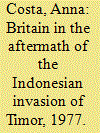

|
|
|
|
|
| Publication |
2013.
|
| Summary/Abstract |
This article fills a gap in the literature of international involvement in the aftermath of the Indonesian invasion of Timor-Leste by providing detailed documentary analysis of British conduct and motives. A substantial amount of scholarship has covered the role played by the United States and Australia during and after the Indonesian invasion of 1975. The lack of scholarly work specific to the role played by Britain during the first years of the Indonesian-Timorese conflict is regrettable as it represents a missing piece in the mosaic of international liability for one of the major massacres committed in the twentieth century. This omission has allowed the official British government version to survive, in which the country plays the role of an honest but ultimately unsuccessful broker working for a diplomatic solution between Indonesia and Portugal that would ensure the right to self-determination for Timor. The existing literature only offers a cursory challenge to this idea of British neutrality.
|
|
|
|
|
|
|
|
|
|
|
|
|
|
|
|
| 8 |
ID:
137378
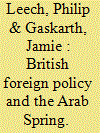

|
|
|
|
|
| Summary/Abstract |
The British government’s varied responses to the popular uprisings of the “Arab Spring” have been criticised for being inconsistent and/or selective. British actions ranged from providing substantial military support for the rebels in Libya to offering notably muted reactions to government suppression of protests in Bahrain. On assuming office, the new foreign secretary, William Hague, suggested that Britain would have a networked approach to foreign policy with a greater awareness of the bilateral interests that Britain had with other countries around the world. This analysis offers a provisional examination of the security, economic, and societal networks that Britain holds with states in the Arab world and, in doing so, tests whether these have any correlation with the British government’s policy towards protests in the region.
|
|
|
|
|
|
|
|
|
|
|
|
|
|
|
|
| 9 |
ID:
131435
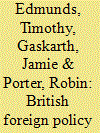

|
|
|
|
|
| Publication |
2014.
|
| Summary/Abstract |
In July 2013, Chatham House hosted a workshop under the auspices of the Global Insecurities Centre of the University of Bristol and the British Foreign Policy Working Group of the British International Studies Association, to explore these challenges. Four of the papers presented at that conference have been chosen for this special selection.
|
|
|
|
|
|
|
|
|
|
|
|
|
|
|
|
| 10 |
ID:
139825
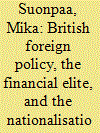

|
|
|
|
|
| Summary/Abstract |
The analysis examines the role of British financial institutions, namely the Bank of England and the Corporation of Foreign Bondholders [CFB], in the making of British policy towards Turkey. The nationalisation of the Constantinople Quays Company, a port operator purchased in 1907 by the British and French governments, serves as a case study through which business–state relations, the role of finance in the conduct of international relations, and the impact of perceptions on policy decisions are explored. In this case, the financial elite’s role was minimal during most of the period considered, becoming more important in the final war years in a framework of the Anglo–Turkish debt restructuring negotiations of 1944. Significantly, the CFB, rather than the Bank, represented the British government in the negotiations. There exists an abundance of evidence of the divergent views between Whitehall and the financial elite about Turkey’s trustworthiness as a debtor and a signatory to treaties. The British government’s perceptions were much more positive than those of the financial elite. This difference stemmed from the different interests involved: Whitehall sought to secure Turkey’s collaboration in the increasingly unstable global security environment while the Bank and the CFB were more concerned with investor and bondholder interests and attempted to avoid further financial losses.
|
|
|
|
|
|
|
|
|
|
|
|
|
|
|
|
| 11 |
ID:
078551
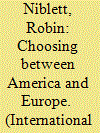

|
|
|
|
|
| Publication |
2007.
|
| Summary/Abstract |
Power in Britain has changed hands from a prime minister who sought to balance intense UK-US consultation on foreign policy with the ambition to be 'at the heart of Europe' to one whose approach towards both the United States and the European Union has yet to be tested. It is an appropriate moment, there fore, to assess how these two contextual poles of British foreign policy-making have changed over recent years and what this might mean for UK foreign policy choices. The premise of this article is that the days are now largely over when the UK can or should start out by trying to build an Anglo-US position on a foreign policy challenge before trying to tie in the European and transatlantic positions. The UK is now a central player in the development of increasingly activist European foreign policies, whether these can later be coordinated effectively with the United States or not. A strong, bilateral relationship continues to serve the interests of both sides on multiple levels, but this relationship does not sit upon the same foundations as during the Cold War. There are now significant underlying factors, especially since the terrorist attacks of September 11 2001 in the US and July 7 2005 in the UK, that pull the US away from Europe and the UK, while pushing the UK towards Europe as the first port of call in developing foreign policy strategies. It is also notable that, today, UK positions on most global issues and foreign policy challenges tend to conform more closely to the dominant EU line than to the United States. On balance, the UK might think about European integration more from a US than from a European perspective, but it now thinks about global problems more from a European than from a US or transatlantic perspective
|
|
|
|
|
|
|
|
|
|
|
|
|
|
|
|
| 12 |
ID:
131437
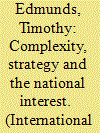

|
|
|
|
|
| Publication |
2014.
|
| Summary/Abstract |
British strategy-making has been subject to a sustained critique in recent years, from parliamentarians, retired members of the armed forces and scholars of strategic studies. This article examines the nature of this critique and the evolving character of strategic practice in Britain. It argues that the criticisms of British strategymaking are often misplaced, for two main reasons. First, many base their critique on a reductionist notion of unitary 'national interest' that fails to capture systemic patterns of complexity and contestation in the wider security environment and in Britain. Second, they underestimate or ignore the extent to which the UK strategic community is itself innovating in response to these themes, particularly since the 2010 Strategic Defence and Security Review. This is not to argue that considerable challenges do not remain for strategy-making in Britain. Most notably, these include: how to translate strategic innovation in departments and elsewhere into a coherent national strategic agenda; how to do this while maintaining institutional coordination and a shared sense of strategic purpose across government (and beyond); how to sustain and consolidate institutional expertise and experience in a rapidly changing civil service and at a time of continuing public austerity; and how to articulate and legitimate security policy decisions among a general public that is both disengaged from elite strategic discourse and sceptical of the efficacy of military force. Even so, the article concludes by arguing that it is possible to see the outline of an emergent and distinctive theory of action in contemporary British strategic practice, characterized by principles of adaptivity, anticipation, self-organisation and nascent cross-governmentalism.
|
|
|
|
|
|
|
|
|
|
|
|
|
|
|
|
| 13 |
ID:
132020
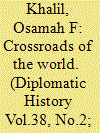

|
|
|
|
|
| Publication |
2014.
|
| Summary/Abstract |
In this paper, I argue that the "Middle East" is an ideational construct maintained by geographical, intellectual, and ideological representations. I assert that the geographical boundaries of the area called the Middle East have shifted over the past century to reflect the strategic interests of the major hegemonic power in the region, initially Britain and later the United States. Drawing on published and archival sources, I trace the etymology of the "Middle East" and its accompanying geographical representations and their relationship to key American and British foreign policy decisions and declarations. I also discuss how the Arabic translation of the "Middle East," or al-Sharq al-Awsa?, has been adopted and contested by scholars and journalists in the region.
|
|
|
|
|
|
|
|
|
|
|
|
|
|
|
|
| 14 |
ID:
093625
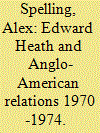

|
|
|
|
|
| Publication |
2009.
|
| Summary/Abstract |
As British Prime Minister, Edward Heath is generally believed to have presided over a distinct cooling in Anglo- American relations. His frosty personality, use of the term "natural"-instead of "special"-relationship, and determination to re-orient British foreign policy towards the European Community are felt to have deliberately foreclosed a more intimate partnership with the administration of Richard Nixon. This interpretation is captured most vividly in the writings of the President's National Security Adviser, and later Secretary of State, Henry Kissinger. In contrast to such views, this article argues that despite considerable challenges, Anglo- American relations during Heath's premiership were not fundamentally weakened. Nor can Heath be considered "anti-American." Moreover, the frictions experienced were often the result of American actions rather than anything which happened in London. A new understanding of Heath's actions and the circumstances of the time are needed when assessing the "special relationship" in this period.
|
|
|
|
|
|
|
|
|
|
|
|
|
|
|
|
| 15 |
ID:
183873
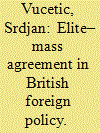

|
|
|
|
|
| Summary/Abstract |
Thirty years ago, William Wallace likened British foreign policy to a musical tug-of-war between the ‘Anglo-Saxons’ and ‘Europeans’, attributing ‘all the best tunes’ to the former. This article revisits Wallace's thesis and its main concept: national identity. It finds that Wallace was right to draw attention to the power of the ruling elite to shape Englishness and Britishness. However, the article also finds that ‘global’ foreign policy ideas were never the exclusive province of a segment of the British elite. Rather, they circulated in English and more broadly British society writ large, reflecting and reinforcing deep-seated, even unselfconscious, agreements between both ‘Anglo-Saxon’ and ‘European’ elites on the one hand, and much of the mass consumer public on the other. It follows that the constraints posed on possibilities of foreign policy change were always greater than Wallace had suggested; that a ‘lesser’ British foreign policy that was, and still is, so hard to imagine for the British is significant for analysis of dynamics of ‘western’ knowledge production that come under critique in this special issue. But rather than focusing exclusively on elites, critical analyses of knowledge exchange should be attuned to popular common sense, too.
|
|
|
|
|
|
|
|
|
|
|
|
|
|
|
|
| 16 |
ID:
132235
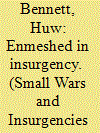

|
|
|
|
|
| Publication |
2014.
|
| Summary/Abstract |
Ten years of counterinsurgency in Iraq and Afghanistan have produced little in Britain's national interest. This article examines the political objectives set in these wars and the reasons why they have proved elusive. The core foreign policy aim was to sustain Britain's position as a great power by assuming responsibility for global order. Alliances with the United States and NATO would be the diplomatic tool for pursuing this aim. These alliances brought obligations, in the shape of agreed common threats. Rogue regimes with weapons of mass destruction and international terrorists harboured in failed states were deemed the primary threats to British security. Military means were therefore used in Iraq and Afghanistan to attack them. Whether Tony Blair's vision of global order ever made sense is debatable, and it attracted scepticism from the outset. The article argues experience in Iraq and Afghanistan showed that a strategy to eliminate terrorism (the WMD threat turned out never to have existed) by expeditionary counterinsurgency could only fail. Therefore the attention lavished on operational-level performance by most studies is misplaced, because no amount of warfighting excellence could make up for strategic incoherence. Finally, the article proposes the more important question arising from the last ten years is why the UK pursued a futile strategy for so long. The difficulties associated with interpreting events, a malfunctioning strategic apparatus, weak political oversight, and bureaucratic self-interest are posited as the most significant explanations.
|
|
|
|
|
|
|
|
|
|
|
|
|
|
|
|
| 17 |
ID:
124185
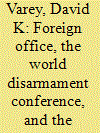

|
|
|
|
|
| Publication |
2013.
|
| Summary/Abstract |
The traditional interpretation of British foreign policy during the World Disarmament Conference has cast Britain as the honest broker, seeking to bring France and Germany together in a bid to square their respective differences over security and equality. But from the Foreign Office perspective, honest brokerage did not place Britain between Germany and France but between the ex-Allied Powers on one side and Germany on the other. This recasting of honest brokerage had two particular strands, with the Foreign Office desirous, first, to secure French support for any sort of disarmament programme before seeking German adherence and, second with an eye to the post-Treaty of Versailles international order, to circumscribe German military potential where at all possible. While the conference results remain the same, this interpretation alters the traditional role and suggested motivations of the Foreign Office between 1932 and 1934.
|
|
|
|
|
|
|
|
|
|
|
|
|
|
|
|
| 18 |
ID:
094597
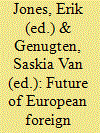

|
|
|
|
|
| Publication |
London, Routledge, 2009.
|
| Description |
199p.
|
| Standard Number |
9780415478717
|
|
|
|
|
|
|
|
|
|
|
|
Copies: C:1/I:0,R:0,Q:0
Circulation
| Accession# | Call# | Current Location | Status | Policy | Location |
| 054852 | 327.4/JON 054852 | Main | On Shelf | General | |
|
|
|
|
| 19 |
ID:
178501
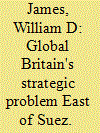

|
|
|
|
|
| Summary/Abstract |
Why did Britain withdraw from its military bases in the Arabian Peninsula and Southeast Asia midway through the Cold War? Existing accounts tend to focus on Britain's weak economic position, as well as the domestic political incentives of retrenchment for the ruling Labour Party. This article offers an alternative explanation: the strategic rationale for retaining a permanent presence East of Suez dissolved during the 1960s, as policymakers realised that these military bases were consuming more security than they could generate. These findings have resonance for British officials charting a return East of Suez today under the banner of ‘Global Britain’.
|
|
|
|
|
|
|
|
|
|
|
|
|
|
|
|
| 20 |
ID:
191678
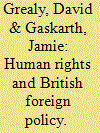

|
|
|
|
|
| Summary/Abstract |
This Special Issue brings the broader history of ‘ethical’ foreign policymaking in the UK into conversation with more contemporary case studies. In doing so, it highlights key issues that have shaped, and will continue to impact, Britain’s ability to play a leading role in the advancement of human rights norms and institutions as a ‘middle power’ within a shifting global order (Cooper and Dal, Citation2016; Efstathopoulos Citation2018; Murray and Brianson Citation2019). For some time, scholarly engagement with the ethics of British foreign policy and human rights promotion was dominated by discussion of New Labour’s foreign policy outlook as articulated in Robin Cook’s ‘mission statement’ for the Foreign and Commonwealth Office (FCO) in May 1997. British foreign affairs, Cook asserted, must have an ‘ethical dimension’ and the Labour government would therefore put human rights ‘at the heart’ of its foreign policy – a line that morphed in the media into ‘ethical foreign policy’ (Guardian, Citation1997). While New Labour has been credited for breaking new ground in terms of British engagement with the international human rights regime, this Special Issue looks to examine periods either side of the Cook era, to gain a wider historical picture of how human rights have been incorporated into British foreign policy (Wheeler and Dunne Citation1998; Gaskarth Citation2006; Gilmore Citation2015).
|
|
|
|
|
|
|
|
|
|
|
|
|
|
|
|
|
|
|
|
|